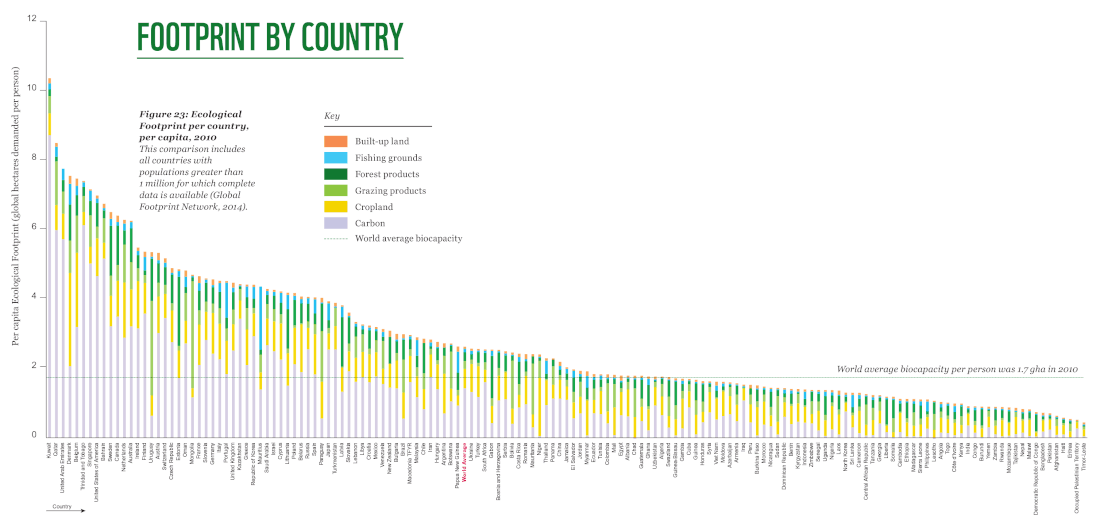Though population growth rates may be higher in developing countries, the real problem is in developed countries. The number of children isn't the biggest problem, rather it's "exploding human consumption." People who have children in developed countries are disproportionately impacting the planet because of their much larger ecological footprint. For example, in terms of impact on the planet, one child in Qatar - often in top five - is equivalent to at least 30 children from Haiti and maybe many more depending on how you calculate consumption. In fact, reducing the number of children you have is the single best way to reduce your carbon footprint.
Of course, these calculations are based on averages. Which suggests that those that consume far more resources in developed countries are having an even larger impact on the planet. Those with more wealth tend to have a disproportionate impact. The primary determinant of a person’s actual ecological footprint is income, followed by geography (rural versus urban), various socioeconomic indicators (age, education level, etc.), and household size. For example, the richest 10% of people are having the greatest impact on carbon emissions (Capitalism is killing the world’s wildlife populations, not ‘humanity’).
"And here’s the thing: These are the emissions connected to your personal choices. But just by living in America (or any wealthy, developed country) and enjoying its shared resources and infrastructure, you are responsible for a certain baseline level of its shared emissions as well. Even if every American could get their lifestyle emissions down somewhere close to that baseline, it still wouldn’t be nearly enough to solve climate change. To reduce Americans’ per-capita baseline to sustainable levels will require decarbonizing power, transportation, and industry, goals over which most individuals have limited control. And even fairly radical lifestyle changes are meaningless at the level of global emissions unless they are multiplied by many millions. To imagine lifestyle choices making a substantial dent in global warming is to imagine a goodly portion of the world’s rich people voluntarily living a lifestyle that is relatively ascetic even by US middle-class standards." -David Roberts (Vox)
Of course, these calculations are based on averages. Which suggests that those that consume far more resources in developed countries are having an even larger impact on the planet. Those with more wealth tend to have a disproportionate impact. The primary determinant of a person’s actual ecological footprint is income, followed by geography (rural versus urban), various socioeconomic indicators (age, education level, etc.), and household size. For example, the richest 10% of people are having the greatest impact on carbon emissions (Capitalism is killing the world’s wildlife populations, not ‘humanity’).
"And here’s the thing: These are the emissions connected to your personal choices. But just by living in America (or any wealthy, developed country) and enjoying its shared resources and infrastructure, you are responsible for a certain baseline level of its shared emissions as well. Even if every American could get their lifestyle emissions down somewhere close to that baseline, it still wouldn’t be nearly enough to solve climate change. To reduce Americans’ per-capita baseline to sustainable levels will require decarbonizing power, transportation, and industry, goals over which most individuals have limited control. And even fairly radical lifestyle changes are meaningless at the level of global emissions unless they are multiplied by many millions. To imagine lifestyle choices making a substantial dent in global warming is to imagine a goodly portion of the world’s rich people voluntarily living a lifestyle that is relatively ascetic even by US middle-class standards." -David Roberts (Vox)
Top 10: Kuwait, Qatar, United Arab Emirates, Denmark, Belgium, Trinidad and Tobago, Singapore, United States, Bahrain, and Sweden.
You can give up a car, switch to a plant-based diet, reduce your travel, buy an electric car, recycle, and switch your light bulbs to more energy efficient types, but it still doesn't minimize your carbon footprint as much as reduced family size does. And yet, you rarely hear this discussed in conservation circles. In fact, many of the biggest conservation groups have massively rich board members with family sizes that likely put their carbon footprint equal to entire villages in Africa. See The best way to reduce your carbon footprint is one the government isn’t telling you about.

